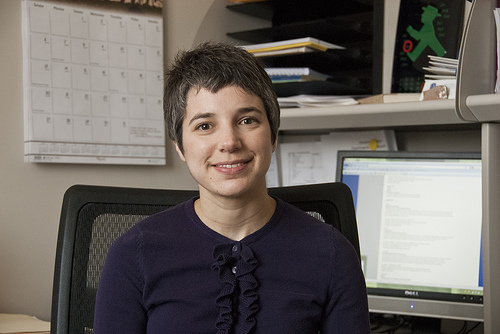 Research can have a basic or an applied focus. Dr. Jean Pretz’s creativity research emphasizes both the basic question of ‘what is creativity?’ and the applied question of ‘does encouraging students to think critically and creatively help them be more creatively successful in college?’ Research projects, designed to answer these questions, look at influences on creativity, the role of critical thinking, and if creative potential is something researchers can measure to predict who will be successful.
Research can have a basic or an applied focus. Dr. Jean Pretz’s creativity research emphasizes both the basic question of ‘what is creativity?’ and the applied question of ‘does encouraging students to think critically and creatively help them be more creatively successful in college?’ Research projects, designed to answer these questions, look at influences on creativity, the role of critical thinking, and if creative potential is something researchers can measure to predict who will be successful.
Pretz, associate professor of psychology and director of the Stamps Program at Elizabethtown College, earned a bachelor’s degree at Wittenberg University and a doctorate at Yale University. Her research areas are creativity, how it relates to academic achievement and the relationship between intuition and expertise. Students have aided Pretz in much of her research as well. All students in the psychology department are required to take two classes in which they collect their own research data, which will sometimes line up well with a professor’s current research. “Because I’ve got these huge projects with a lot of set-up, lots of data, it helps my students ask their research questions using that data,” Pretz said. Her research allows psychology students to work on their individual projects, and their work sometimes becomes subprojects for Pretz’s overall creativity research.
For her current research, Pretz has been studying optional supplementary sections from E-town’s admissions applications. These extra creative assignments intended to help students whose SAT scores or GPAs, alone, might not help them gain admission. The supplementary sections work like extra credit, in a way; they cannot hurt students’ applications, only help. Pretz’s research focuses on a broad line of how creativity is related to many things, such as college-level academics and SAT scores, personality and belief in the levels of one’s own creative ability. This broader focus allows her to collect data from many different areas and ensure uniformity in her research.
It’s very exciting to create new knowledge.”
Pretz’s collaborator on the admissions research project is Dr. James Kaufman, a professor of education psychology at the University of Connecticut. They aim not only to answer the question of whether creativity can predict further success, but also whether SAT scores and GPAs should remain the most important aspects of applications at which colleges look. Nelson said many colleges’ admissions offices will base their admissions process solely on GPAs or SAT scores, but some schools have shifted to involve creativity, which is more comprehensive than basing admission solely on students’ academics. Katherine Cotter ’14 spearheaded the admissions research project for her student research. “She looked at the value of including high school extracurricular involvement in predicting creativity,” Pretz said. Currently, Cotter’s paper detailing research is under revision for publication.
One student working with Pretz is Danielle Nelson ’15. She began helping with the creativity research when she was a first-year, collecting data, organizing it and randomizing it. “We rate each [piece of data] on creativity and appropriateness,” she said. Nelson’s research focuses on two types of creative mindsets. The first is the incremental mindset, meaning people believe they can improve their creativity with practice. A fixed mindset means they believe the creativity they were born with is all they have and can never be increased. Nelson’s research looks into whether or not there is a connection between mindset and creativity; if people who believe they are more creative have an incremental mindset. “My favorite part is seeing the connections between things, so it’s interesting to see how things relate to each other,” she said.
Pretz’s main research involves asking for the participation of students from outside her classes, but some of the material for her personal research comes from inside the classroom. Last semester, she asked students from her neuroscience class to work on a creative project and a mini-research paper. “I think it helps to think outside the box,” she said. “I called it a creative case study.” Her students were asked to choose a neurological disorder and represent it in a creative abstract medium.
The process of research is something Pretz loves. Her two favorite parts of research are coming up with new ideas no one else has explored and having the tools to explore them. “It’s very exciting to create new knowledge,” she said. Equally interesting to Pretz are data analysis and designing assignments that get students to think creatively while challenging them and meeting course criteria. She said designing projects to help people be creative in new ways is where she feels she gets to be creative.


She is an amazing woman and creativity is her middle name.